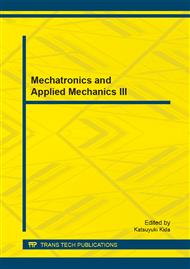p.26
p.31
p.36
p.41
p.46
p.50
p.58
p.62
p.70
Study on Linear Active Disturbance Rejection Control Technique and its Application in Ship-Borne Servo Control System
Abstract:
In order to improve the rejection ability of the boat rocking disturbance and wind load disturbance on Ship-borne Servo Control System, the position linear ADRC (LADRC) is designed. First, mathematical model of Ship-borne Servo Control System is established, and PID control method is used for simulation. Methods used LADRC, estimated and compensated the wind disturbances and boats rocking disturbances, greatly. The simulation results show that ADRC method for active immunity, which greatly improves the immunity system and tracking accuracy, and the parameter adjustment is simple, just adjust a parameter can get good control performance.
Info:
Periodical:
Pages:
46-49
DOI:
Citation:
Online since:
February 2014
Authors:
Price:
Сopyright:
© 2014 Trans Tech Publications Ltd. All Rights Reserved
Share:
Citation:


